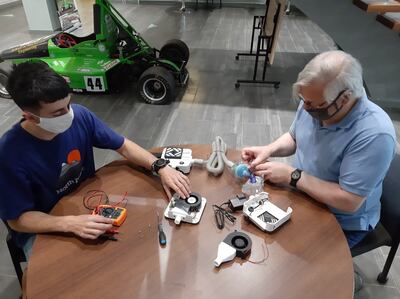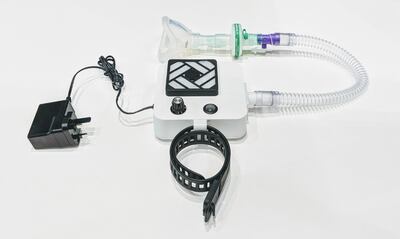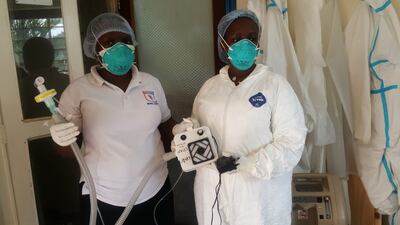A cheap breathing device for Covid patients is being developed that could save lives in poorer countries that do not have access to the latest high-tech medicine.
The new device provides a form of oxygen therapy called continuous positive airway pressure (CPAP), which has been effective in helping patients struggling to breathe.
A prototype of the £150 ($207) device was found to be “safe and well tolerated” in tests and now a patient trial is due to start in Uganda.
Researchers at the University of Leeds used the principles of “frugal innovation” to design the breathing aid and keep it simple and robust but also medically sound.
A key innovation was the generation of air flow using a simple electric fan, similar to fans used to cool electronic devices, to overcome the lack of access to high-pressure air and oxygen supplies in the countries where it will be used.
In a paper published on Tuesday in the journal Frontiers in Medical Technology, the team developing the device said it has been tested in a pilot evaluation on 10 healthy volunteers.

It found the breather “can be used safely without inducing hypoxia [low levels of oxygen in tissues] or hypercapnia [build-up of carbon dioxide in the bloodstream] and that its use was well tolerated by users, with no adverse events reported”.
“By adopting the approach of frugal innovation, we have been able to redesign an important piece of medical equipment so it can function effectively in poorer-resourced healthcare settings,” said Nikil Kapur, professor of applied fluid dynamics at the University of Leeds.
“We have stripped away unnecessary complexity and ensured the device will work in settings where oxygen supplies are scarce and need to be conserved,” he added.
“The prototype is an important step in developing a device that will create greater access to critical-care technology and help save lives.”

Components for the prototype device cost around £150 whereas conventional CPAP machines can cost from about £600, and a ventilator used in an intensive care unit can cost more than £30,000.
“In the UK, CPAP has been effective as the mainstay of respiratory treatment for severe Covid-19 and helps to keep patients from needing advanced ICU care such as ventilators,” said Dr Tom Lawton, a critical care consultant and member of the research team.
“In many countries, resource limitations mean that even CPAP is difficult to come by and more severe disease frequently leads to death.
“Simple CPAP devices, designed to operate in a resource-limited setting, can help reduce global healthcare inequality and save lives both now with Covid-19 and potentially with other diseases in the future.”
Clinics and hospitals in poorer nations may not have access to centralised oxygen supplies, where oxygen is piped under pressure to wards, or a steady supply of oxygen cylinders.

The breather unit’s fan system provides safe air flow without needing complex, costly control systems or a high-pressure air source, meaning it is a simple and robust means to generate enough airflow to open the patient’s airways
“The prototype has been specifically made to work with oxygen concentrators, which have a low flow of oxygen and at low pressure,” said Dr Pete Culmer, the study’s lead author.
“The fan or CPAP blower is connected to what is known as a breathing circuit. That circuit is made up of a filter to catch viruses and bacteria in the air flow, tubing, face mask, a valve which controls the flow of oxygen from the oxygen concentrator, and an expiration outlet.”
A trial involving sick patients is planned to begin at the Mengo Hospital in Kampala, Uganda, next month.
The device was developed by a team from the University of Leeds, Leeds Teaching Hospitals NHS Trust, Bradford Teaching Hospitals NHS Foundation Trust, Medical Aid International and the Mengo Hospital.

